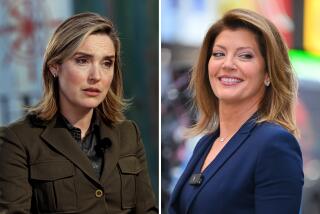Q&A: CBS News debate moderator John Dickerson set to face Trump and the Republicans
John Dickerson, political director for CBS News and moderator for “Face the Nation,” gets his second debate of the primary season tonight when he questions the six remaining contenders for the 2016 Republican presidential nomination in Greenville, S.C., tonight. He took a break from rehearsals for the event to explain why the debates in this campaign are more influential - and popular - than ever.
If you filled out a card six months ago with your top six candidates, how close would it resemble what you’ll have on stage Saturday night?
My card would have had Wisconsin Gov. Scott Walker in this. It would not have had Donald Trump. Donald Trump is obviously a big surprise in Republican politics. But the fact that Walker flamed out so fast is another big surprise of the season. There are a lot of reasons to think Walker would have made it to the final stage. Republicans like governors. Here was a governor who had taken on the unions, a group that Republicans had not liked over the years. I would have guessed that three or four of the candidates would have been on the stage.
Have you ever seen a debate moment as pivotal as the one we saw last Saturday when Gov. Chris Christie went after Sen. Marco Rubio?
Gerald Ford in the 1976 debate with Jimmy Carter in which he said there was no Soviet domination of [Eastern Europe]. That was a kind of a moment that rolled over a few days. It was basically Ford and Max Frankel of the New York Times. Some people watching it may have not have understood what was going on.
It’s hard to forget the look on Max Frankel’s face after Ford answered.
He did the double take on the air. When Tim Pawlenty in one of the early Republican primary debates in 2012 didn’t own up to a criticism of Mitt Romney on stage that he had been making in conversations - that hurt him. But nothing in the way that [Christie’s attack] did with Marco Rubio by Rubio’s own admission.
How do you think Rubio will try to reestablish himself as top contender?
I think he’ll have a line ready to dismiss the past debate performance and he’ll accentuate his foreign policy expertise as a way of showing he’s ready for the office, because he knows what he’s talking about. It’s a familiar strategy for all one-term senators. Barack Obama certainly did it when he was running. There will be a lot of answers that show he has a depth of knowledge.
How do you think Donald Trump has evolved as a debater?
On the debate stage and in his public appearances he has moderated by his own admission. It will be interesting to see if he comes back with a more pugilistic bent. In the last debate he had that sharp exchange with Jeb Bush, which some people watching scored as a big loss for Trump. But in the exit polls when people were asked did the debates matter in your vote, two-thirds said yes. And a plurality of the people who scored the debate winner picked Trump. So whatever he is doing in the debates, it’s working for him.
It seems like attacking the moderators was a tactic for some of the candidates in the early Republican primary debates. Now they are going after each other. Does it make your job a bit easier?
There is always something to be gained by going after the moderator if the question gives the candidate pause. But I think your point is right. The stakes are high and they need to make distinctions between themselves and their opponents. The game is not to so much get noticed, which the confrontations with moderators have done in the past.
There have been a lot of debates in this primary season, but the TV audiences are still pretty substantial. Why do you think viewer engagement remains so strong?
You have passionate candidates about whom people are excited -- Bernie Sanders and Donald Trump. Ted Cruz has incredibly enthusiastic supporters. In other ways, so do the other candidates. They have loyal followings. At the center of both party debates are questions that are real and important. What’s the role of money in politics? Do you need a pragmatic person who can move through four yards and a cloud of dust? Or do you need someone who can lift everybody’s eyes to the horizon and call for a revolution? The exit polls taken at the New Hampshire primary found that 56% of Republicans see themselves as betrayed by their party. That sense of betrayal is what’s leading to a lot of this interest. They want to know if they’ve got a new champion who will ease that sense of betrayal and act on their behalf. People are tuning in because they are angry and hopeful. That would tend to build you a pretty good audience.
Follow @SteveBattaglio on Twitter
More to Read
From the Oscars to the Emmys.
Get the Envelope newsletter for exclusive awards season coverage, behind-the-scenes stories from the Envelope podcast and columnist Glenn Whipp’s must-read analysis.
You may occasionally receive promotional content from the Los Angeles Times.











